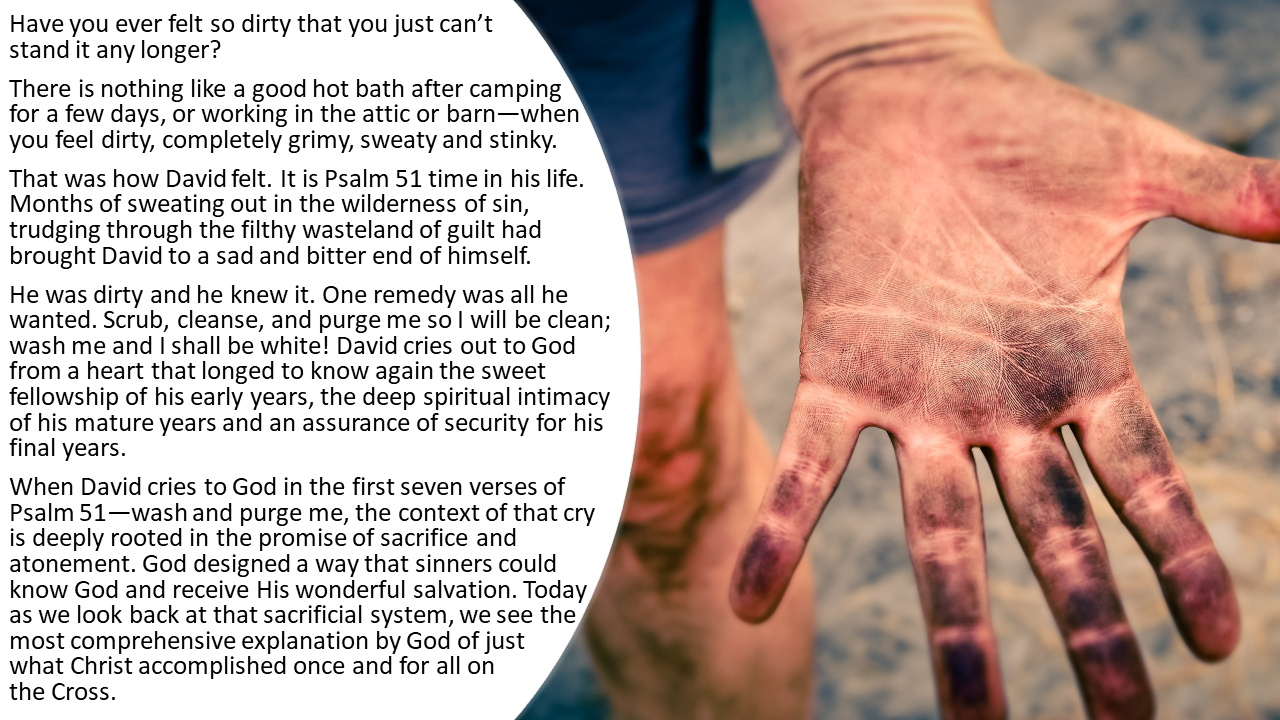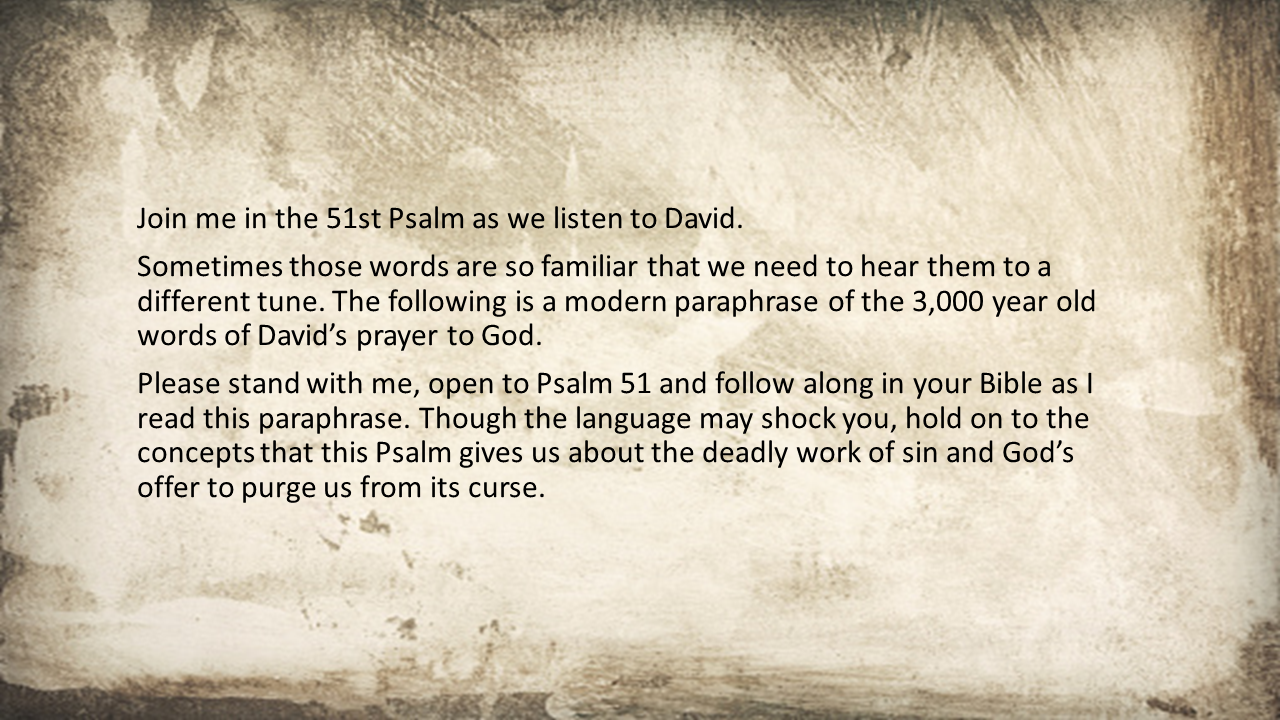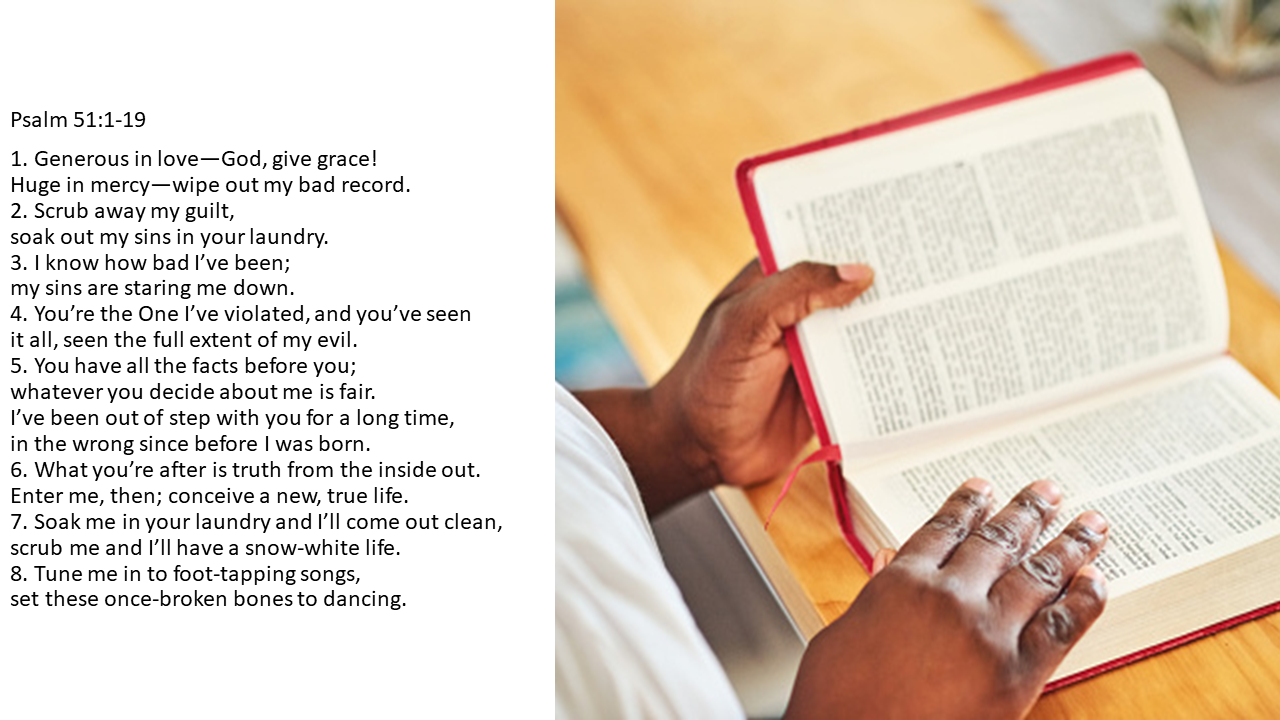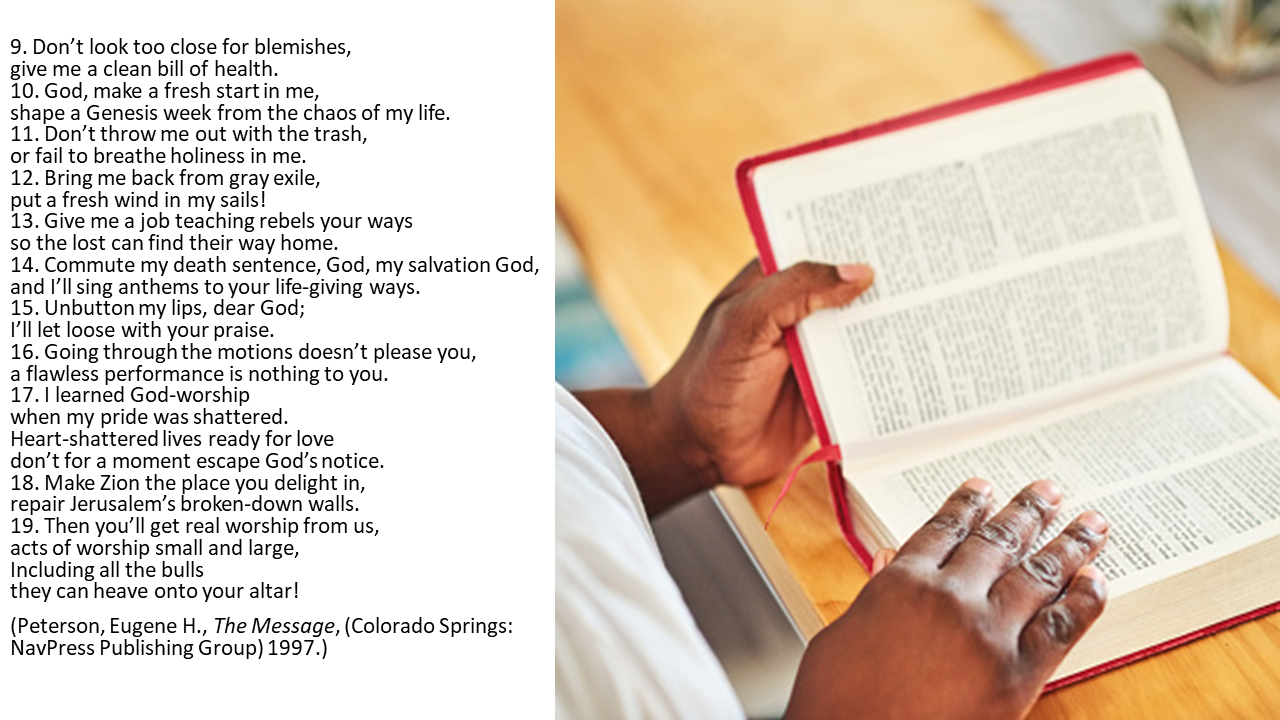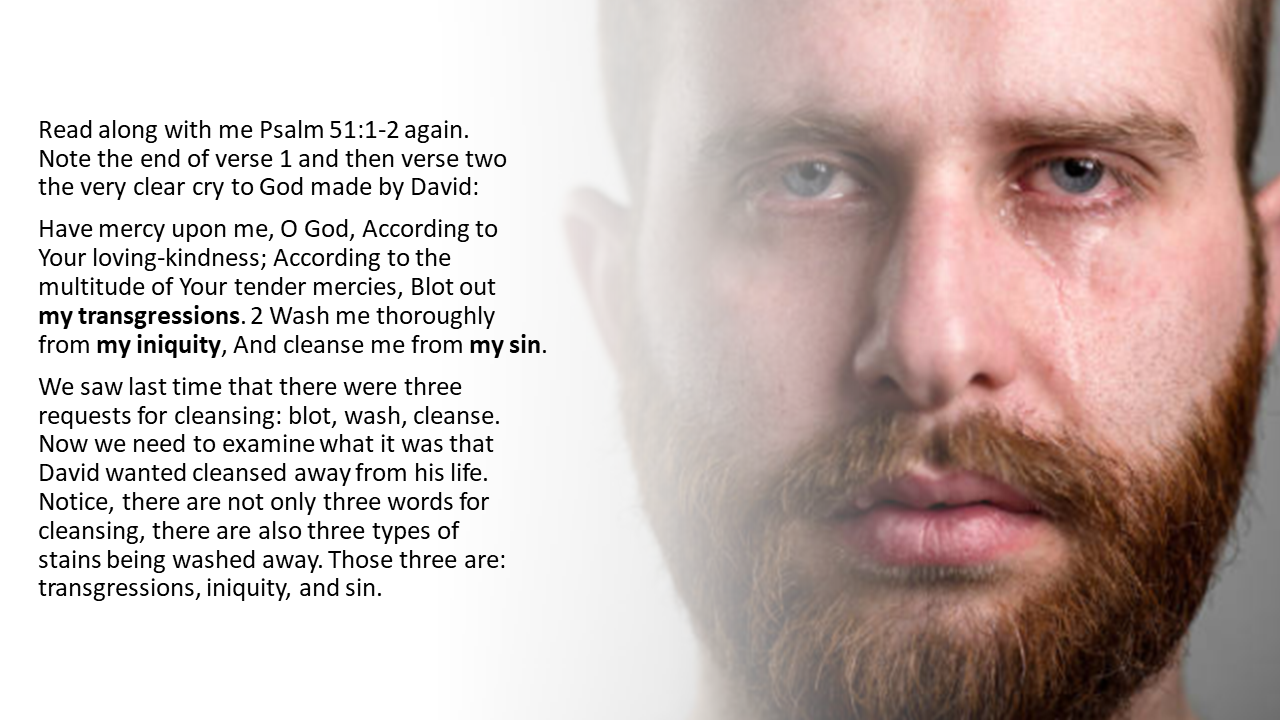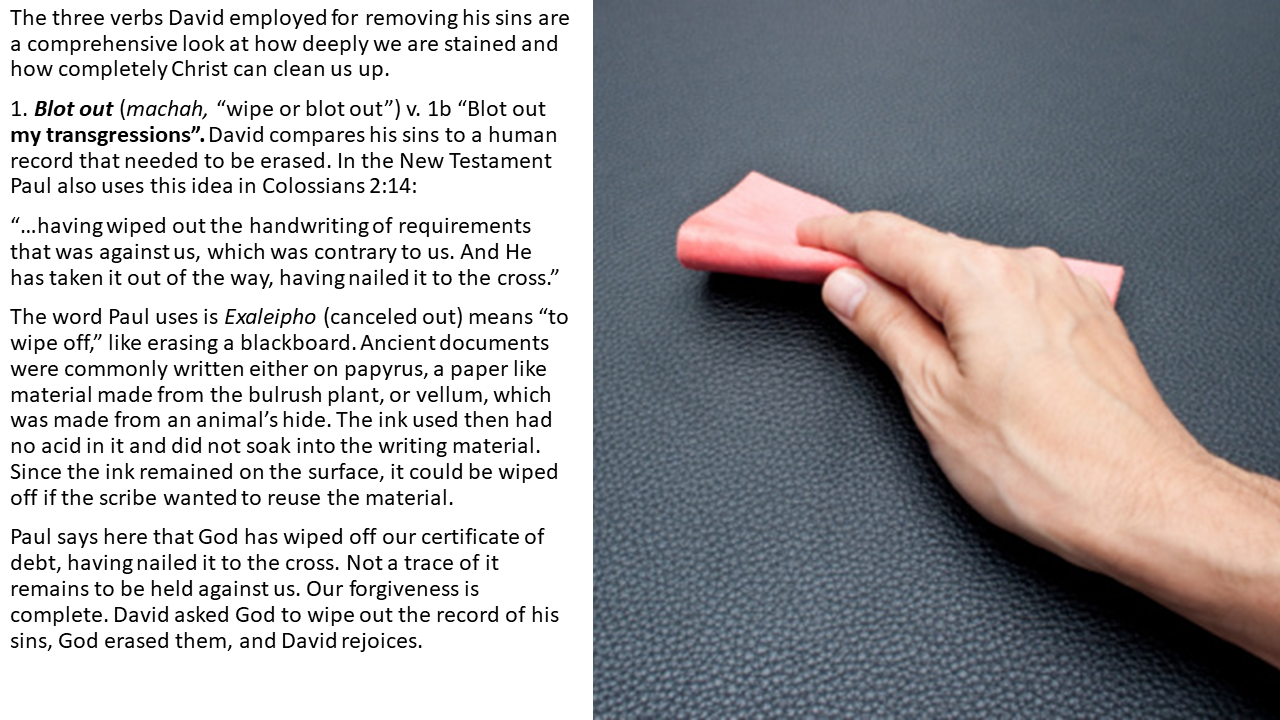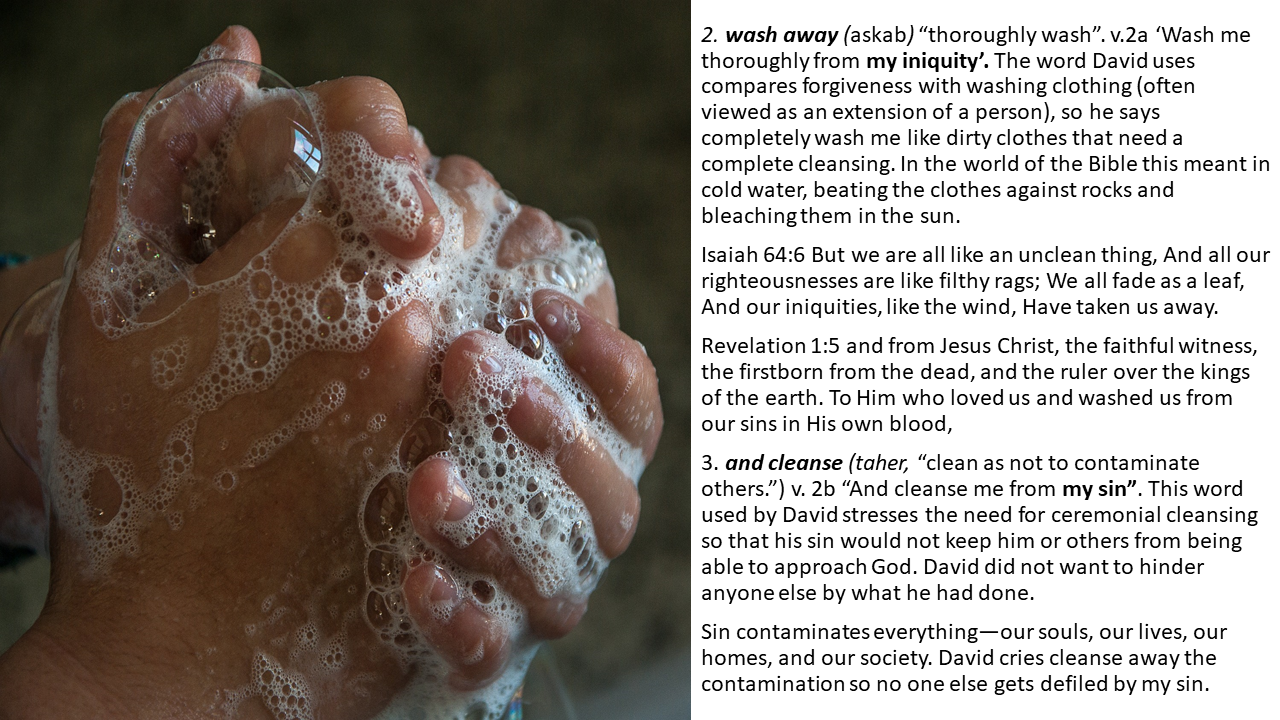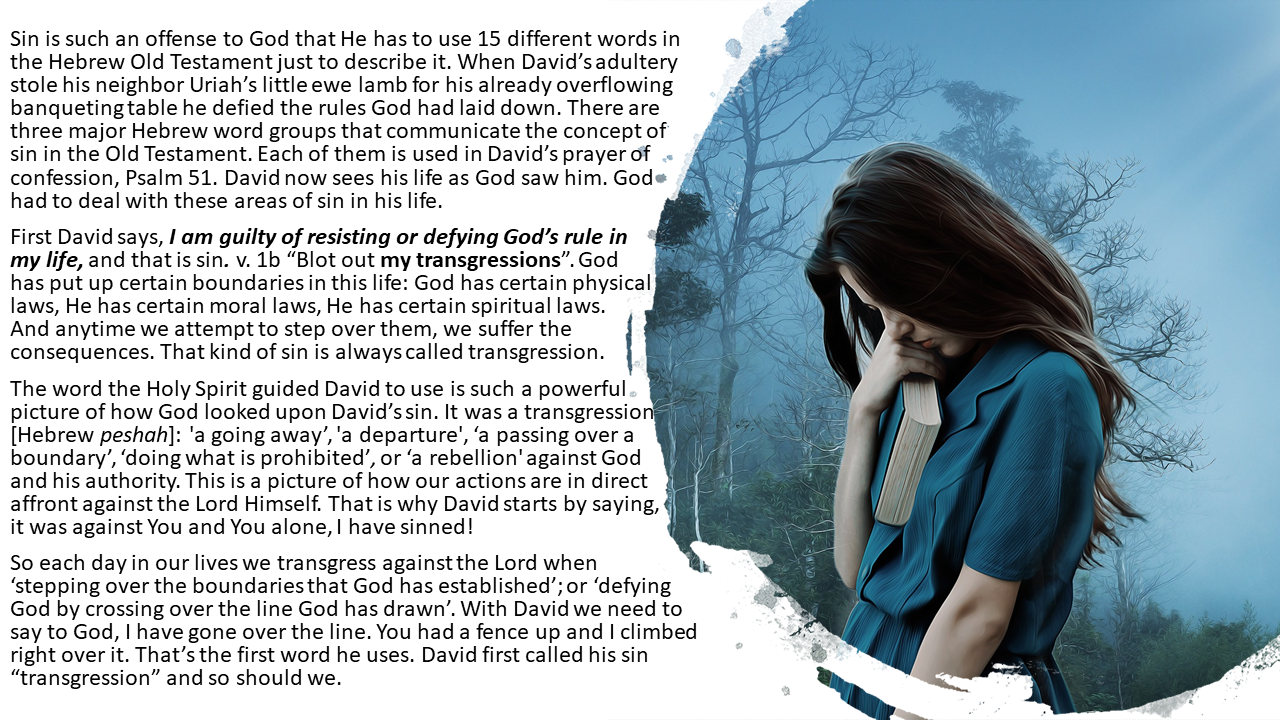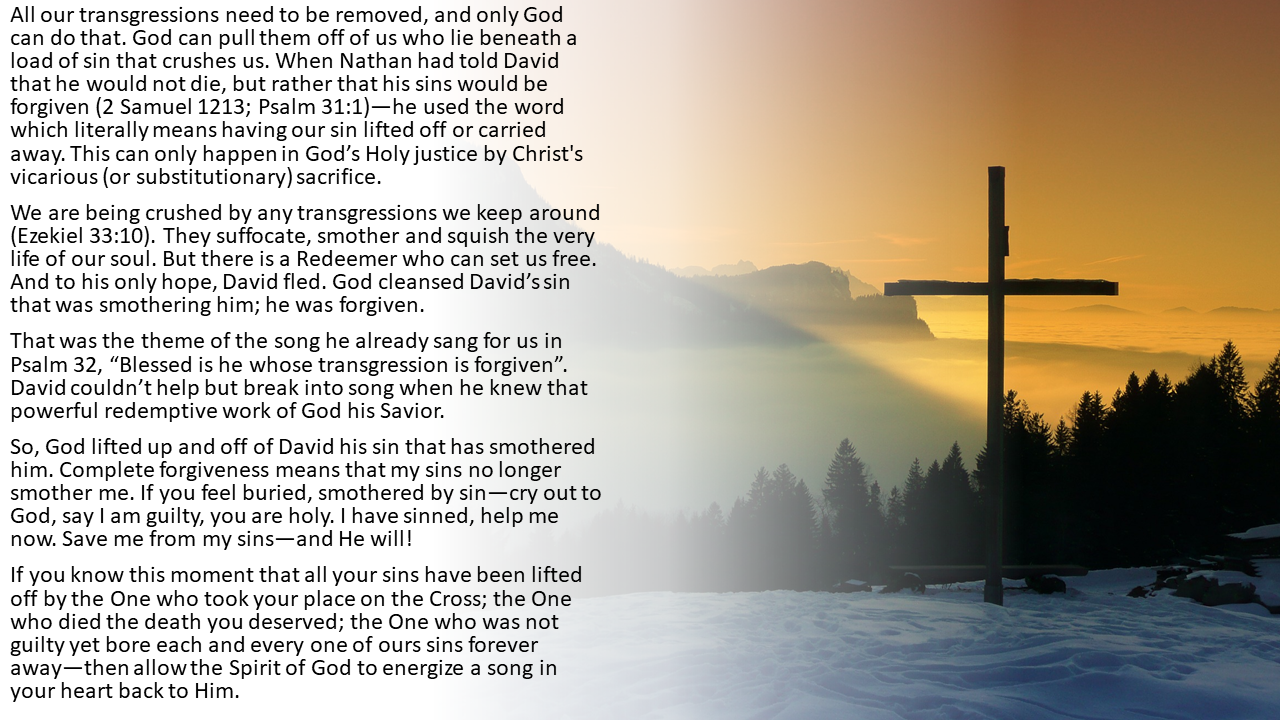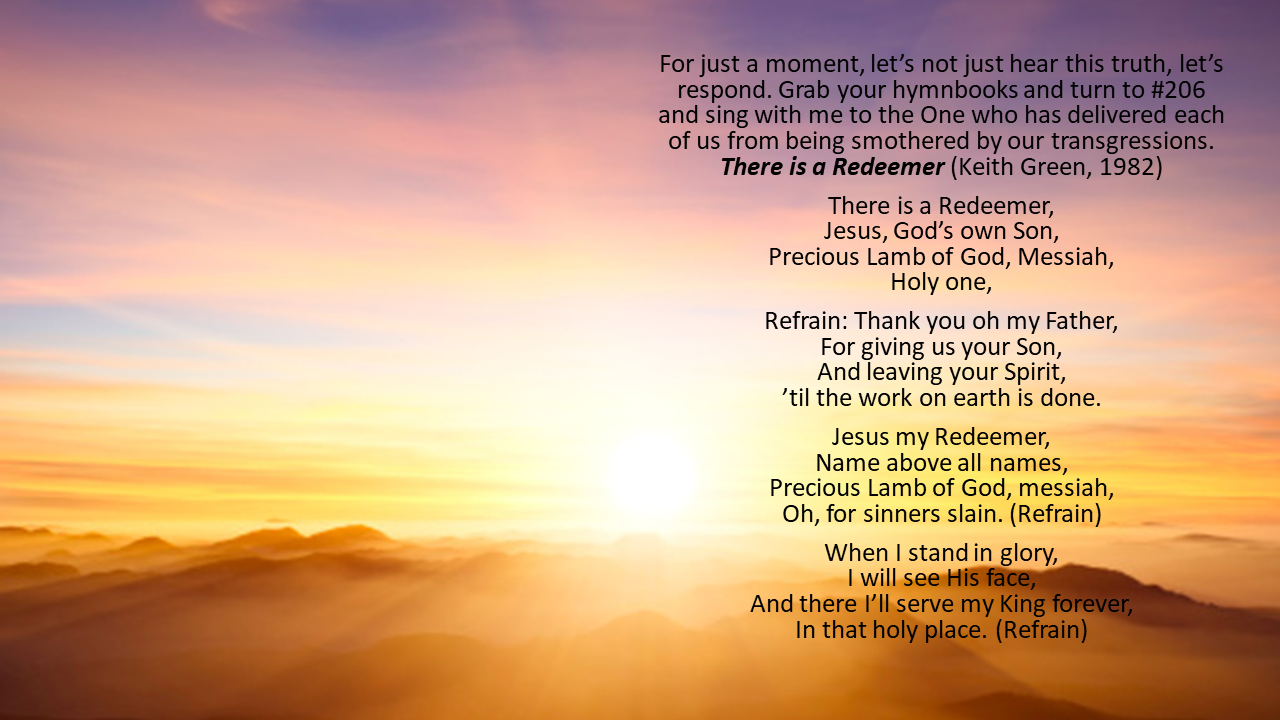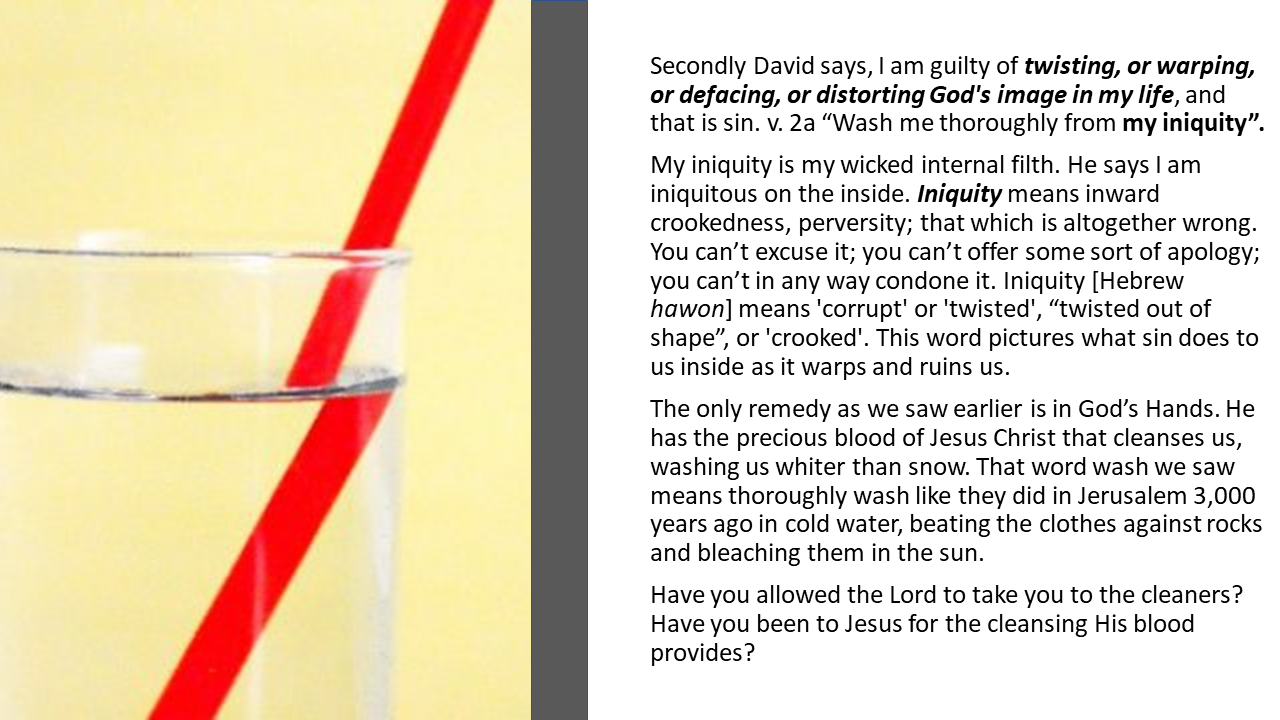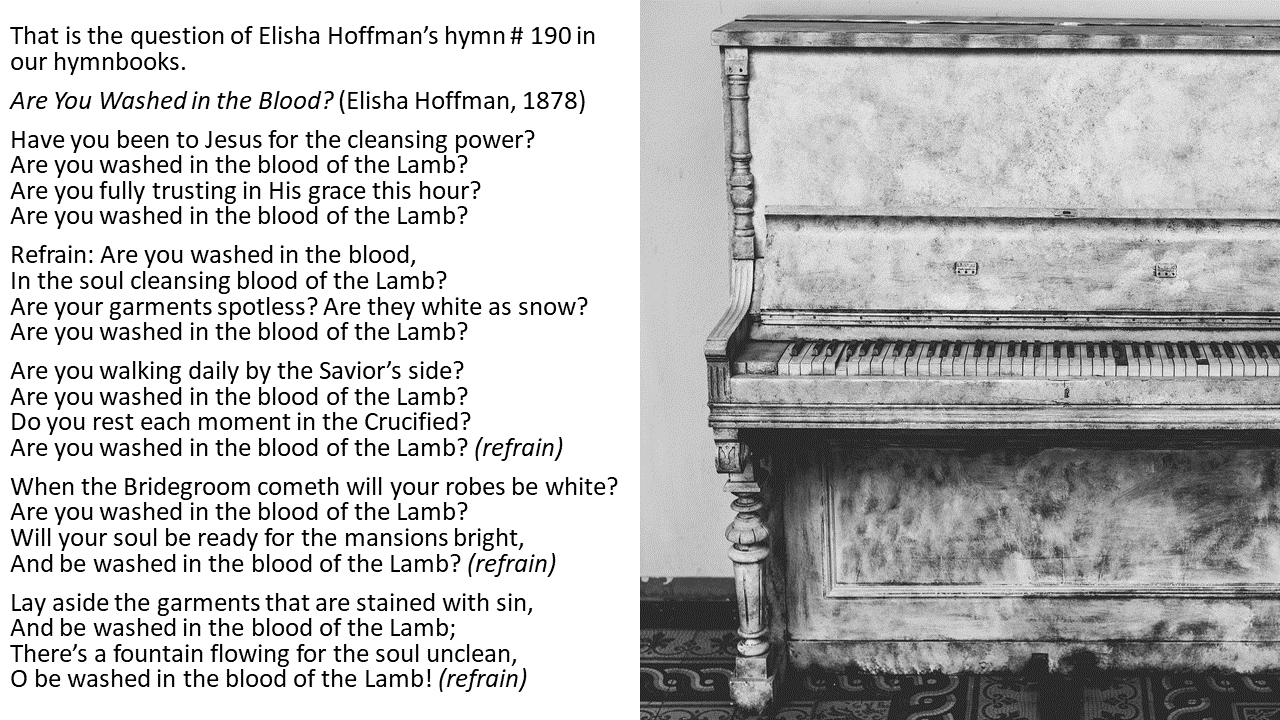If the YouTube video above is not available, here are two other ways to view:
David – Purge Me
060813AM
DSS-28
PSALM 51:1-7
Have you ever felt so dirty that you just can’t stand it any longer?
There is nothing like a good hot bath after camping for a few days, or working in the attic or barn—when you feel dirty, completely grimy, sweaty and stinky.
That was how David felt. It is Psalm 51 time in his life. Months of sweating out in the wilderness of sin, trudging through the filthy wasteland of guilt had brought David to a sad and bitter end of himself.
He was dirty and he knew it. One remedy was all he wanted. Scrub, cleanse, and purge me so I will be clean; wash me and I shall be white!
David cries out to God from a heart that longed to know again the sweet fellowship of his early years, the deep spiritual intimacy of his mature years and an assurance of security for his final years.
When David cries to God in the first seven verses of Psalm 51—wash and purge me, the context of that cry is deeply rooted in the promise of sacrifice and atonement. God designed a way that sinners could know God and receive His wonderful salvation. Today as we look back at that sacrificial system, we see the most comprehensive explanation by God of just what Christ accomplished once and for all on the Cross.
Join me in the 51st Psalm as we listen to David.
Sometimes those words are so familiar that we need to hear them to a different tune. The following is a modern paraphrase of the 3,000 year old words of David’s prayer to God.
Please stand with me, open to Psalm 51 and follow along in your Bible as I read this paraphrase. Though the language may shock you, hold on to the concepts that this Psalm gives us about the deadly work of sin and God’s offer to purge us from its curse.
Psalm 51:1-19
1. Generous in love—God, give grace! Huge in mercy—wipe out my bad record.
2. Scrub away my guilt, soak out my sins in your laundry.
3. I know how bad I’ve been; my sins are staring me down. 4. You’re the One I’ve violated, and you’ve seen it all, seen the full extent of my evil.
5. You have all the facts before you; whatever you decide about me is fair. I’ve been out of step with you for a long time, in the wrong since before I was born. 6. What you’re after is truth from the inside out. Enter me, then; conceive a new, true life.
7. Soak me in your laundry and I’ll come out clean, scrub me and I’ll have a snow-white life. 8. Tune me in to foot-tapping songs, set these once-broken bones to dancing.
9. Don’t look too close for blemishes, give me a clean bill of health. 10. God, make a fresh start in me, shape a Genesis week from the chaos of my life.
11. Don’t throw me out with the trash, or fail to breathe holiness in me. 12. Bring me back from gray exile, put a fresh wind in my sails! 13. Give me a job teaching rebels your ways so the lost can find their way home.
14. Commute my death sentence, God, my salvation God, and I’ll sing anthems to your life-giving ways. 15. Unbutton my lips, dear God; I’ll let loose with your praise.
16. Going through the motions doesn’t please you, a flawless performance is nothing to you. 17. I learned God-worship when my pride was shattered. Heart-shattered lives ready for love don’t for a moment escape God’s notice.
18. Make Zion the place you delight in, repair Jerusalem’s broken-down walls. 19. Then you’ll get real worship from us, acts of worship small and large, Including all the bulls they can heave onto your altar!1
Pray
We are returning to one of the greatest examples of God’s forgiving love in the entire Bible.
David sinned, he was chastened and convicted, he turns back to God in humble contrite repentance—and now he pleads for the cleansing only God can give.
 We saw last time how clearly David saw that his sin was against God. This must be the starting place for any relief, any forgiveness, and any cleansing.
We saw last time how clearly David saw that his sin was against God. This must be the starting place for any relief, any forgiveness, and any cleansing.
I AM GUILTY
That is the first thing David says (51:1a), next David says—
WASH ME PSALM 51:1b–7
Remember that when it comes to our spiritual side, our minds, our consciences and that part of us that is eternal—only the Lord can WASH US CLEAN.
This next section of Psalm 51 is so very important, if not this moment, then in the not too distant future each of us will seek for cleansing when we sin. That is what God explains through this inspired record of David’s prayer.
Read along with me Psalm 51:1-2 again. Note the end of verse 1 and then verse two the very clear cry to God made by David:
Have mercy upon me, O God, According to Your loving-kindness; According to the multitude of Your tender mercies, o Blot out my transgressions. o 2 Wash me thoroughly from my iniquity, o And cleanse me from my sin.
We saw last time that there were three requests for cleansing:
blot, wash, cleanse.
Now we need to examine what it was that David wanted cleansed away from his life. Notice, there are not only three words for cleansing, there are also three types of stains being washed away. Those three are: transgressions, iniquity, and sin.
The three verbs David employed for removing his sins are a comprehensive look at how deeply we are stained and how completely Christ can clean us up.
1. Blot out (machah, “wipe or blot out”) v. 1b “Blot out my transgressions”. David compares his sins to a human record that needed to be erased. In the New Testament Paul also uses this idea in Colossians 2:14:
“…having wiped out the handwriting of requirements that was against us, which was contrary to us. And He has taken it out of the way, having nailed it to the cross.”
The word Paul uses is Exaleiphoμ (canceled out) means “to wipe off,” like erasing a blackboard. Ancient documents were commonly written either on papyrus, a paper like material made from the bulrush plant, or vellum, which was made from an animal’s hide. The ink used then had no acid in it and did not soak into the writing material. Since the ink remained on the surface, it could be wiped off if the scribe wanted to reuse the material.
Paul says here that God has wiped off our certificate of debt, having nailed it to the cross. Not a trace of it remains to be held against us. Our forgiveness is complete. David asked God to wipe out the record of his sins, God erased them, and David rejoices.
2. wash away ( kaμb _as ) “thoroughly wash”. v.2a ‘Wash me thoroughly from my iniquity’. The word David uses compares forgiveness with washing clothing (often viewed as an extension of a person), so he says completely wash me like dirty clothes that need a complete cleansing. In the world of the Bible this meant in cold water, beating the clothes against rocks and bleaching them in the sun.
Isaiah 64:6 But we are all like an unclean thing, And all our righteousnesses are like filthy rags; We all fade as a leaf, And our iniquities, like the wind, Have taken us away.
Revelation 1:5 and from Jesus Christ, the faithful witness, the firstborn from the dead, and the ruler over the kings of the earth. To Him who loved us and washed us from our sins in His own blood,
3. and cleanse (taher, “clean as not to contaminate others.”) v. 2b “And cleanse me from my sin”. This word used by David stresses the need for ceremonial cleansing so that his sin would not keep him or others from being able to approach God. David did not want to hinder anyone else by what he had done.
Sin contaminates everything—our souls, our lives, our homes, and our society. David cries cleanse away the contamination so no one else gets defiled by my sin.
What Sin is David talking about?
SEEING SIN ON GOD’S TERMS
Sin is such an offense to God that He has to use 15 different words in the Hebrew Old Testament just to describe it. When David’s adultery stole his neighbor Uriah’s little ewe lamb for his already overflowing banqueting table he defied the rules God had laid down.
There are three major Hebrew word groups that communicate the concept of sin in the Old Testament. Each of them is used in David’s prayer of confession, Psalm 51.
David now sees his life as God saw him. God had to deal with these areas of sin in his life.
1. First David says, I am guilty of resisting or defying God’s rule in my life, and that is sin. v. 1b “Blot out my transgressions”.
God has put up certain boundaries in this life: God has certain physical laws, He has certain moral laws, He has certain spiritual laws. And anytime we attempt to step over them, we suffer the consequences. That kind of sin is always called transgression.
The word the Holy Spirit guided David to use is such a powerful picture of how God looked upon David’s sin. It was a transgression [Hebrew peshah]: ‘a going away’, ‘a departure’, ‘a passing over a boundary’, ‘doing what is prohibited’, or ‘a rebellion’ against God and his authority. This is a picture of how our actions are in direct affront against the Lord Himself. That is why David starts by saying, it was against You and You alone, I have sinned!
So each day in our lives we transgress against the Lord when ‘stepping over the boundaries that God has established’; or ‘defying God by crossing over the line God has drawn’. With David we need to say to God, I have gone over the line. You had a fence up and I climbed right over it. That’s the first word he uses. David first called his sin “transgression” and so should we.
All our transgressions need to be removed, and only God can do that. God can pull them off of us who lie beneath a load of sin that crushes us. When Nathan had told David that he would not die, but rather that his sins would be forgiven (2 Samuel 1213; Psalm 31:1)—he used the word which literally means having our sin lifted off or carried away. This can only happen in God’s Holy justice by Christ’s vicarious (or substitutionary) sacrifice.
We are being crushed by any transgressions we keep around (Ezekiel 33:10). They suffocate, smother and squish the very life of our soul. But there is a Redeemer who can set us free.
And to his only hope, David fled. God cleansed David’s sin that was smothering him; he was forgiven. That was the theme of the song he already sang for us in Psalm 32, “Blessed is he whose transgression is forgiven”. David couldn’t help but break into song when he knew that powerful redemptive work of God his Savior.
So, God lifted up and off of David his sin that has smothered him. Complete forgiveness means that my sins no longer smother me. If you feel buried, smothered by sin—cry out to God, say I am guilty, you are holy. I have sinned, help me now. Save me from my sins—and He will!
If you know this moment that all your sins have been lifted off by the One who took your place on the Cross; the One who died the death you deserved; the One who was not guilty yet bore each and every one of ours sins forever away—then allow the Spirit of God to energize a song in your heart back to Him.
For just a moment, let’s not just hear this truth, let’s respond. Grab your hymnbooks and turn to #206 and sing with me to the One who has delivered each of us from being smothered by our transgressions.
There is a Redeemer (Keith Green, 1982)
There is a redeemer, Jesus, God’s own Son, Precious Lamb of God, Messiah, Holy one,
* Thank you oh my father, For giving us your son, And leaving your spirit, ’til the work on earth is done.
Jesus my redeemer, Name above all names, Precious lamb of god, messiah, Oh, for sinners slain. *
When I stand in glory, I will see his face, And there I’ll serve my king forever, In that holy place. *
2. Secondly David says, I am guilty of twisting, or warping, or defacing, or distorting God’s image in my life, and that is sin. v. 2a “Wash me thoroughly from my iniquity”.
My iniquity is my wicked internal filth. He says I am iniquitous on the inside. Iniquity means inward crookedness, perversity; that which is altogether wrong. You can’t excuse it; you can’t offer some sort of apology; you can’t in any way condone it. Iniquity [Hebrew hawon] means ‘corrupt’ or ‘twisted’, “twisted out of shape”, or ‘crooked’. This word pictures what sin does to us inside as it warps and ruins us.
The only remedy as we saw earlier is in God’s Hands. He has the precious blood of Jesus Christ that cleanses us, washing us whiter than snow. That word wash we saw means thoroughly wash like they did in Jerusalem 3,000 years ago in cold water, beating the clothes against rocks and bleaching them in the sun.
Have you allowed the Lord to take you to the cleaners? Have you been to Jesus for the cleansing His blood provides?
That is the question of Elisha Hoffman’s hymn # 190 in our hymnbooks.
 Are You Washed in the Blood? (Elisha Hoffman, 1878)
Are You Washed in the Blood? (Elisha Hoffman, 1878)
Have you been to Jesus for the cleansing power? Are you washed in the blood of the Lamb? Are you fully trusting in His grace this hour? Are you washed in the blood of the Lamb?
*Are you washed in the blood, In the soul cleansing blood of the Lamb? Are your garments spotless? Are they white as snow? Are you washed in the blood of the Lamb?
Are you walking daily by the Savior’s side? Are you washed in the blood of the Lamb? Do you rest each moment in the Crucified? Are you washed in the blood of the Lamb? *
When the Bridegroom cometh will your robes be white? Are you washed in the blood of the Lamb? Will your soul be ready for the mansions bright, And be washed in the blood of the Lamb? *
Lay aside the garments that are stained with sin, And be washed in the blood of the Lamb; There’s a fountain flowing for the soul unclean, O be washed in the blood of the Lamb! *
3. Thirdly David says, I am guilty of falling short of God’s perfection and missing God’s mark in my life, and that is also sin. v. 2b “And cleanse me from my sin”.
Sin means missing the mark. David says I have missed the mark. And God says we all fall short of His glory. God is perfect and holy–and no matter how hard we try, we just can’t get up to Him. We fall short of Him.
There is a divine standard which, for some reason, a person does not live up to. That’s all—just to miss the mark. You don’t come up to God’s standard. It’s in that sense that all of us today are sinners. None of us come up to the standard of God. All come short of the glory of God.
This word for sin [Hebrew chattath] is same as hamartia in Greek ‘coming short’ or ‘falling short’ as in an arrow falling short. The target is God’s law and sin is missing the mark on the target. This is a picture of failing to measure up to God’s Divine Law.
Sin must be cleansed, removed from God’s sight. It is odious and abominable, and must be put out of sight. David’s song in Psalm 32 also describes this cleansing as the blessing of one ‘whose sin is covered’. The word David uses in Psalm 32 for sin being ‘covered by God’ is the same word that is used for the ark of the covenant in the Tabernacle, covered by the mercy-seat. It is also used for the earth covered by the flood, and the Egyptians were covered by the depths of the sea.
When God takes our sins they are buried and unable to return. As Spurgeon said at this point in Psalm 51, what a cover must that be which hides away forever from the sight of the all-seeing God all the filthiness of the flesh and of the spirit!”
Our sins washed, cleansed, and covered also speaks of the strong imagery in the events of the day of atonement. On that day the High priest took the blood of an animal and sprinkled it onto the mercy seat. Above the mercy seat was the presence of God portrayed by the outstretched arms of the cherubim. Beneath the lid of the ark were the tablets portraying God’s divine law.
In essence, the blood on the mercy seat stood between a holy God and the sinners who broke His law, averting His wrath. David cried for joy when the wrath of God was turned away from him. So our sins are covered away by the blood of Jesus shed for us! God cleansed David’s Sin that soils: now they were covered by the cleansing blood.
I sometimes have to just borrow the poets and one put it this way-Horatio G. Spafford once penned these blessed words:
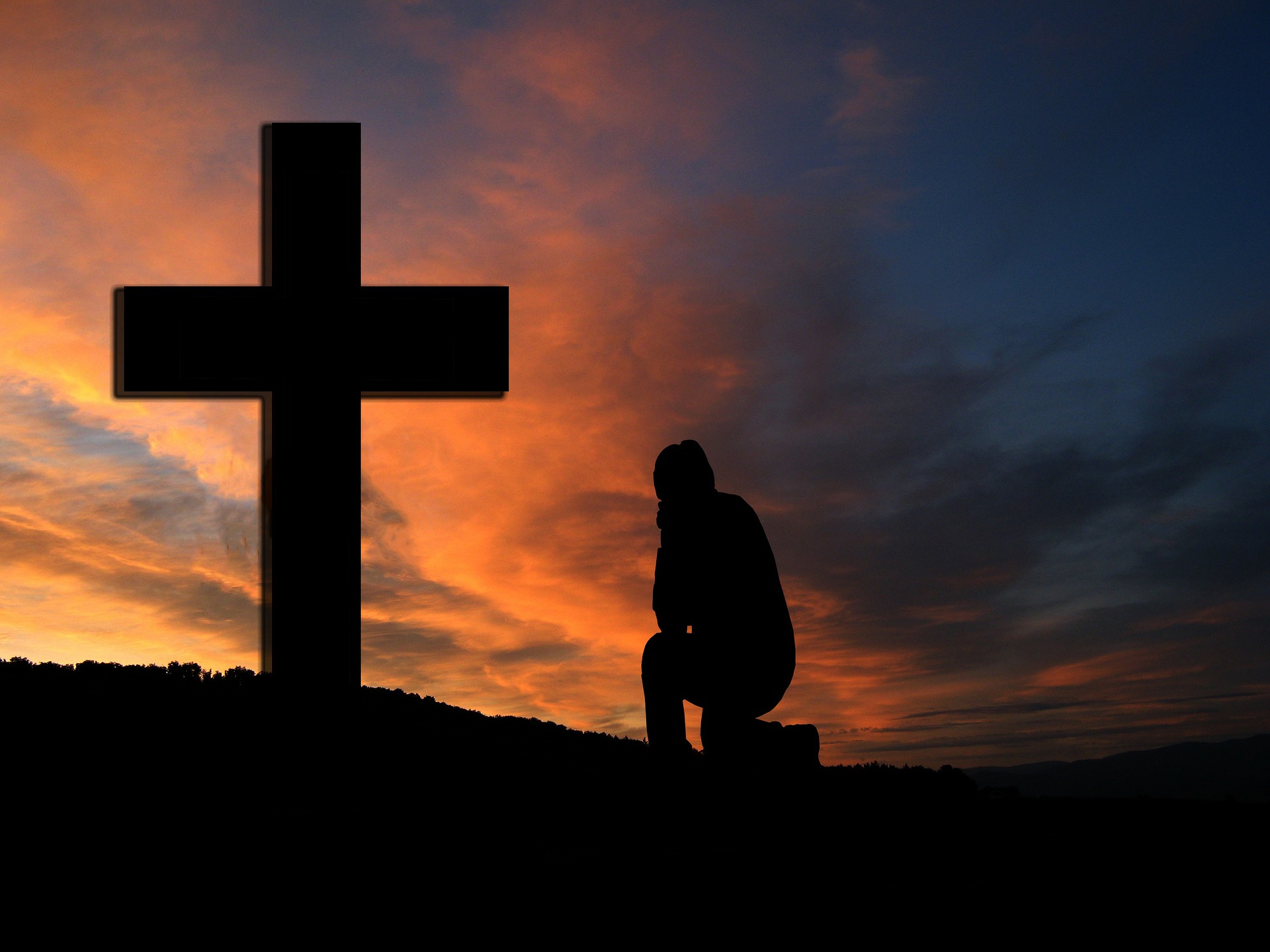 My sin, oh the bliss of this glorious thought— my sin, not in part, but the whole, Is nailed to the cross and I bear it no more, Praise the Lord, praise the Lord, O my soul!
My sin, oh the bliss of this glorious thought— my sin, not in part, but the whole, Is nailed to the cross and I bear it no more, Praise the Lord, praise the Lord, O my soul!
So David says
Blot out my transgressions–I have crossed the line. You said don’t go over that and I went over that.
Wash me thoroughly from my iniquity–I am dirty inside and I can’t make it to You.
And cleanse me from my sin–I’ve missed the mark so I ask You to cleanse me.
1Peterson, Eugene H., The Message, (Colorado Springs: NavPress Publishing Group) 1997.
Slides
Check Out All The Sermons In The Series
You can find all the sermons and short clips from this series, David’s Spiritual Secret here.
Looking To Study The Bible Like Dr. Barnett?
Dr. Barnett has curated an Amazon page with a large collection of resources he uses in his study of God’s Word. You can check it out here.





